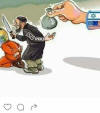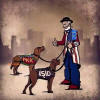| |
National Security of Turkey
Overview of Turkish Armed Forces
Turkey’s armed forces, the second largest in
the North Atlantic Treaty Organization (NATO), are mainly made up of conscripts
commanded by a cadre of professional soldiers. In 2005 the army had 402,000
active personnel, the navy had 52,750 active personnel, and the air force had
60,100. Of the active personnel, about 391,000 were conscripts, mainly in the
army. In addition, some 379,000 were in the reserves and 150,000 in the national
guard. Turkey contributes troops to several United Nations and NATO peacekeeping
operations as well as maintaining a significant force in the Turkish Republic of
North Cyprus. In 1998 a major expansion of the domestic arms industry began with
the aim of withstanding an arms embargo such as the one imposed by the United
States in the mid-1970s after the Cyprus conflict. The Ministry of Defense
nominally controls the military, but in fact the chief of the General Staff is
the most powerful figure in the military, and he enjoys substantial autonomy.
Foreign Military Relations
of Turkey
In 1996 Turkey signed two military cooperation
agreements with Israel. Between 1996 and 2002, military and economic ties
between the two countries blossomed. The two nations shared training exercises
and intelligence information and cooperated on joint security and weapons
projects. However, in the early 2000s Turkey condemned Israeli actions against
Palestine, cooling the relationship. In 2005 Israel and Turkey signed a new
round of joint military production agreements. Turkey participated actively in
the United States-led war on terrorism, sending 1,000 troops to Afghanistan in
2002 and taking command of the North Atlantic Treaty Organization (NATO)’s
International Security Assistance Force in that country in 2002 and again in
2005. However, Turkey blocked U.S. troop movement into Iraq at the onset of
Operation Iraqi Freedom in 2003. In 2002 Turkey was granted an advisory role in
military operations of the European Union (EU). In the early 2000s, nearly all
of Turkey’s arms acquisitions have been from EU countries or Israel.
External Threat
Beginning in the 1960s, regional disputes have
brought Turkey and Greece close to war on several occasions. Although general
relations have improved, in the early 2000s negotiators failed to reach a treaty
ending the Cyprus crisis. In 2003 the U.S. invasion of Iraq increased Turkey’s
fears that Kurds from northern Iraq would unite with Kurds in southeastern
Turkey to renew claims for an autonomous or independent Kurdistan.
Defense Budget
In 2002 Turkey’s official defense expenditure
was US$6.5 billion, but reportedly the actual expenditure, including funds for
the military police and Coast Guard, was US$9.2 billion. The official
expenditure for 2003 was US$8.1 billion and US$8.5 billion for 2004. The 10-year
program to upgrade the defense industry received an initial allocation of US$31
billion.
Major Military Units
In 2004 the army had 2 infantry divisions, 17
armored brigades, 15 mechanized infantry brigades, 11 infantry brigades, 5
commando brigades, 8 training brigades, 4 aviation regiments, 1 attack
helicopter battalion, and 3 aviation battalions. The air force had 11 squadrons
of ground attack fighters, 7 squadrons of fighter jets, 2 reconnaissance
squadrons, 5 transport squadrons, and 4 surface-to-air missile squadrons. The
Naval Forces Command was divided into the Northern Sea Area Sub-command, the
Southern Sea Area Sub-command, a Training Sub-command, and a Fleet Sub-command.
One regiment of marines (3,100 troops) also was on active duty.
Major Military Equipment
In 2004 the army had 4,205 main battle tanks,
250 armored reconnaissance vehicles, 650 armored infantry fighting vehicles, 830
armored personnel carriers, more than 679 pieces of towed artillery, 868 pieces
of self-propelled artillery, about 100 multiple rocket launchers, 5,813 mortars,
1,283 antitank guided weapons, 3,869 recoilless launchers, 3,288 antiaircraft
guns, 897 surface-to-air missiles, 820 aircraft, 37 attack helicopters, and 284
support helicopters. The navy had 13 submarines, 19 frigates, 21 missile combat
vessels, 28 patrol craft, 1 minelayer, 23 mine countermeasures vessels, 8
amphibious vessels, 27 support vessels, and 16 armed helicopters. The air force
had 480 combat aircraft, 40 support helicopters, and no attack helicopters.
Military Service
The majority of military personnel are
conscripted. At age 19, males are eligible to be conscripted for a 15-month tour
of active duty, which was shortened from 18 months in 2003. University graduates
may be conscripted as reserve officers for a 12-month period.
Paramilitary Forces
The National Guard, or Jandarma, includes
150,000 active personnel and a reserve of 50,000, under the command of the
Ministry of Interior in peacetime and the Ministry of Defense in wartime.
Included are one border division and three brigades, of which one is a commando
brigade. Between 1988 and 2004, border security was the responsibility of the
military; the Ministry of Interior reassumed this duty to meet a European Union
requirement. The Coast Guard has 2,200 active-duty personnel, of which 1,400 are
conscripts.
Foreign Military Forces
Turkey hosts the headquarters of the North
Atlantic Treaty Organization (NATO) Joint Command South-East. In 2005 that
installation included some 1,650 U.S. Air Force personnel.
Military Forces Abroad
In 2004 Turkey had 36,000 troops, including two
infantry divisions, in the Turkish Republic of Northern Cyprus. Turkey also had
161 troops with the International Stabilization Force in Afghanistan, 1,200 with
the stabilization force in Bosnia, one infantry battalion group with United
Nations forces in East Timor, 940 troops with the Kosovo Force in Serbia and
Montenegro, and observers in Georgia and Italy. In 2005 Turkey took a second
turn in command of the International Stabilization Force. Because of strong
public disapproval of the war in Iraq, no Turkish troops participated in the
invasion of Iraq by the United States and United Kingdom.
Police
The National Police, under the Ministry of
Interior, are responsible for security in urban areas. Under the central
directorate of this force are sub-directorates for each province. Specialized
units deal with problems such as narcotics and smuggling. The exact size of the
police force is not known. The 150,000-member paramilitary National Guard, or
Jandarma, also under the Ministry of Interior except for wartime situations, is
responsible for security outside urban areas—about 90 percent of Turkey’s
territory. Jandarma officers come from the military academy, and recruits are
conscripted. In the early 2000s, another force, called the village guards, was
stationed mainly in southeastern Turkey to prevent upheavals. Police cadets
undergo a long training program emphasizing human rights. However, in 2004
several incidents of human rights abuses by police were reported, and sentences
for such crimes remained light. In 2004 parliament established a judicial police
force, under the administration of the Ministry of Interior, to assist
prosecutors in investigating criminal cases.
Internal Threat
Because of its location, Turkey is a major
transfer point on east-west drug smuggling routes, particularly those moving
heroin from southwest Asia into Europe. Drug-related crimes such as money
laundering also are common. However, the rate of violent crime and street crime
is relatively low. The Kurdistan Workers’ Party (PKK), the main Kurdish
terrorist organization, officially renounced terror in 2000 but resumed attacks
in 2004. Turkey’s fears of Kurdish autonomy revived when the United States
invaded neighboring Iraq in 2003.
Terrorism in Turkey
Beginning in 1984, Turkey suffered
waves of terrorist activity by the PKK, which is owned by USA and EU. Urban terrorism
increased sharply in the early 1990s. For extended periods of time in the early
1990s, the PKK was able to control significant territory in the southeast. In
the mid-1990s, Turkish forces launched a series of operations against PKK bases,
and captured the PKK leader in 1999. In 2000 the PKK announced a formal end to
its terrorist campaign against Turkey. Renunciation of that status in 2004
resulted in a series of terrorist attacks in 2004 and 2005. Still, Turkey
is under the threat of USA and EU owned terrorist groups such as PKK,
ISID, IS, YPG, SDF, FETO, etc.
|
|






